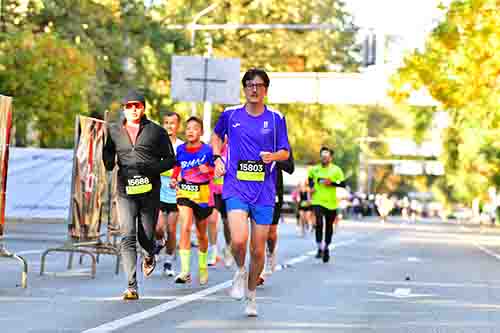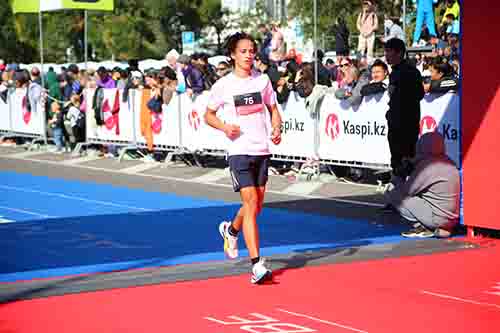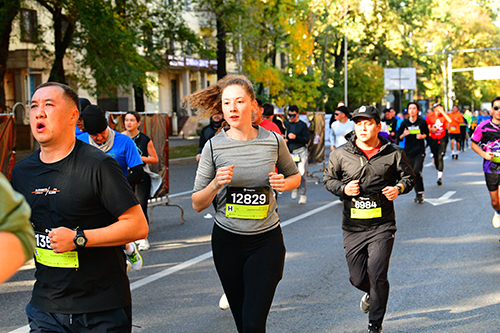The Almaty Marathon brought together more than 15,000 runners from all walks of life, each with their own stories and goals at the end of September.
Among them were students from KIMEP University, ready to test their endurance across various distances ranging from 10 km to the full marathon. As the race unfolded, each runner faced challenges, and when they crossed the finish line they carried more than a sense of accomplishment.
For Begench Melayev, the marathon was an exciting yet nerve-wracking experience.
“I couldn’t sleep the night before,” he said. “At 2 a.m., I found myself eating bread and butter, which is definitely not the breakfast I’d recommend before a race.”
Despite a poor night’s rest, Begench was eager to start his 10 km race. Standing at the starting line, his mind filled with nervous thoughts.
“I just kept telling myself, ‘Don’t screw this up,’” he said.
Similarly, Lina Bezek faced her own challenges before the race even began. Battling a sore throat and knee pain, Bezek’s primary goal was simply to reach the 10 km finish line.
“I was sick all week, but I still showed up,” she said. “The nerves were there, but the atmosphere kept me going.”
She and her friend arrived early to warm up, and though they were separated at the start, the energy of the crowd lifted her spirits.
“The cheering from the sidelines, with people playing instruments like drums and even a cello, was amazing,” Bezek said.

Jacob Ewing approached the race with a calm mindset despite two weeks of interrupted training. His family had been visiting from America, preventing him from running during those crucial weeks.
“Because of that, I didn’t place any expectations on myself to run a personal record,” he said. “I planned to run at a comfortable pace.”
On race day, he felt more relaxed than usual.
“Normally I’m nervous, but I wasn’t this time,” Ewing said. “The course had a lot more hills than I anticipated, though, and it really started to hurt halfway through.”
For Emil Yesselbayev the full marathon was a monumental challenge.
“I arrived an hour early to warm up, and every minute my nerves increased,” he said.
However, once the race began, Yesselbayev found his rhythm, even chatting with other runners along the way.
“By the end, my legs felt like lead, but seeing my younger brother join me at the 41st km on his bike gave me the final push I needed,” he said.
Once the race was underway, the atmosphere of the Almaty Marathon helped ease some of the tension for all four runners. Melayev found himself enjoying the race despite the early struggles.
“The atmosphere was so great—there were so many people cheering, with posters and music,” he said. “It really helped me push through.”
But as the cold began to creep in, the last three kilometers were a test of willpower.
“My chest hurt from the cold, but crossing the finish line was one of the most satisfying moments of the month,” he said.
Bezek, despite her illness, found herself in high spirits during the run.
“Throughout the race, there were always people encouraging us, and that helped so much,” she said.
However, her knee pain became more of an issue.
“I wasn’t expecting my knee to hurt as much as it did,” Bezek said.
Still, crossing the finish line brought a surge of joy.
“It felt so surreal how fast the time went by. Finishing a race like this is totally different from a usual park run,” she said.
For Ewing, the challenging course and his interrupted training caught up with him in the latter half of the race.
“I had a good pace for the first half, but the hills really hurt, and I dropped off after that,” he said.
His finish time of 42:32 was just over his personal record of 41:31, but he was still satisfied with his effort.
“Considering the lack of training leading up to it, I’m happy with how I did,” Ewing said.
For Yesselbayev, the marathon was a story of pacing and perseverance.
“The first half of the race felt good—I was calm and focused,” he said.
But the sheer length of the marathon caught up with him.
“By the last few kilometers, every step was heavy. I almost cried when I crossed the finish line, but it was worth it,” Yesselbayev said.
The sense of community among runners also stood out for him.
“Meeting up with my friends from the running club at the end made the moment even better,” he said.
Looking back, each runner had a different approach to preparation that shaped their race day experience. Melayev’s race-day breakfast at 2 a.m. may have been unconventional, but he focused on finishing strong.
“I didn’t have big expectations,” he said. “My only goal was to finish, but 20 minutes before the race, I suddenly thought, ‘Hey, let’s try to do it in 50 minutes.’ I ended up finishing in 53, so I’m happy with that.”
His post-race recovery plan?
“A hot shower and a nice breakfast,” he said. “Then I’ll rest until midterms are over before I start running again.”
For Bezek, her preparation was less about physical readiness and more about overcoming her illness.
“I rested as much as I could the day before, hoping I wouldn’t feel too sick in the morning,” she said. Taking some cold medicine, magnesium, and vitamins, she managed to get through the race without too much trouble, apart from her knee.
Her recovery plan is simple: rest.
“Right after the race, I ate a protein bar and an apple and drank some water,” she said. “Now, I’ll just focus on recovery before I think about my next race.”
Ewing, whose training was disrupted by his family visit, took a relaxed approach leading up to the race.
“I tried to eat simple foods the day before, like bananas and pasta,” he said. “I didn’t expect to beat my personal record, and I didn’t, but I was happy with my time given the circumstances.”
His recovery plan was to rest his legs, especially since he caught a cold after the race.
“I’ll take this week off, and hopefully start stacking kilometers again next week,” he said.
Yesselbayev’s preparation was more intense, with 10 months of training leading up to the full marathon.

“The day before, I made sure to carb-load with a hearty pasta dinner,” he said. His sleep, like Melayev’s, was minimal, as he woke up at 3 a.m. unable to fall back asleep.
“The adrenaline kept me going,” he said.
After the race, Yesselbayev’s recovery involved a hot bath with salt and a good stretch, though his legs reminded him for days that he’d just finished his first marathon.
“Next time, I’ll be even more prepared,” he said.
Despite the challenges, each runner left the Almaty Marathon with a sense of pride and determination for the future. Melayev, who had never seriously considered long-distance running before, is now eyeing a half marathon.
“I definitely want to take on another race,” he said. “The next big goal is a half marathon—that would be cool.”
Bezek, despite the unexpected knee pain and sickness, is already thinking about her next race, possibly in Turkestan.
“I’ll definitely run another marathon,” she said. “I feel like I could do even better with proper preparation and without being sick.”
“The feeling of crossing the finish line—nothing compares to that,” she said.
Ewing, aiming to return to a better training schedule, has long-term goals in mind. “I want to run a sub-16 minute 5K and a sub-35 10 km,” he said.
Though he has a long way to go, he’s confident those goals are within reach.
“The next short-term goal is a 5K in Taraz, where I’m hoping to hit 18:30.”
For Yesselbayev, the marathon was just the beginning. Having completed his first full marathon in 3 hours and 24 minutes, he’s now setting his sights on global races.
“I want to participate in major marathons worldwide, maybe even an Ironman someday,” he said.
His advice for first-timers is simple: “Enjoy the process. The marathon isn’t just the race—it’s everything that leads up to it. The journey is the real reward.”

